Live History Classes for K-12th
Please select the grade level that you would like to learn about:
History Kindergarten
History 1st Grade
History 2nd Grade
History 3rd Grade
History 4th Grade
History 5th Grade
History 6th Grade
History 7th Grade
History 8th Grade
History 9th Grade
History 10th and 11th Grades
History 12th Grade
Live Class Payment in Full
- 5% Payment in Full Discount = $565.25
Live Class Payment Plan
- $59.50/mo for 10 Months
History Kindergarten
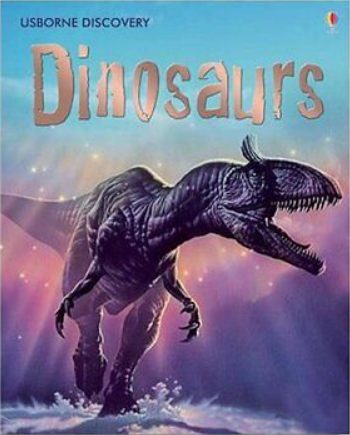 Required Textbooks:
Required Textbooks:
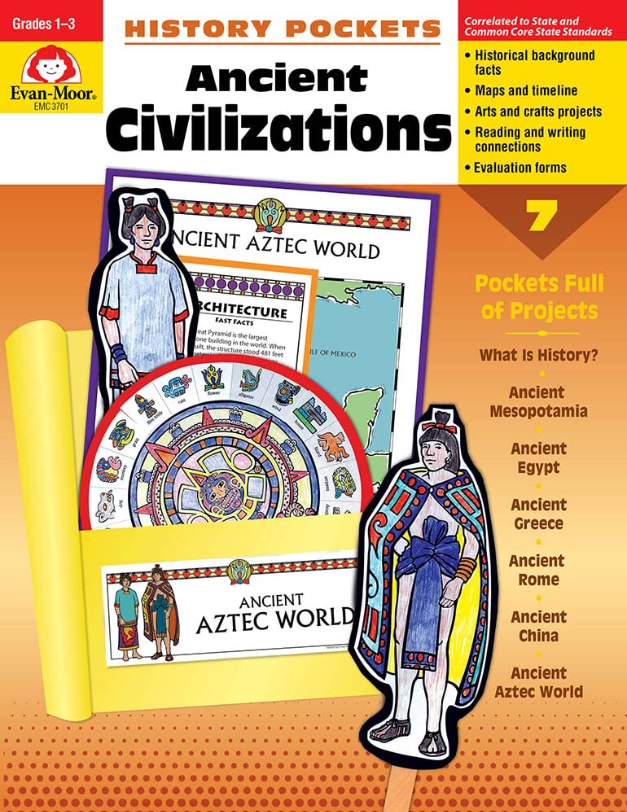
Introduce your child to prehistory with this exciting, colorful book of dinosaurs! This picture-packed book provides attractive and stimulating starting points, giving vivid accounts of the story of life from the beginning of the Earth and the emergence of the dinosaurs and mammals, through the first civilizations.
In addition, we will move through various periods of history using History Pockets: Ancient Civilizations. This book is organized using discovery pockets, each of which introduces a new civilization to your students, including the ancient worlds of Mesopotamia, Egypt, Greece, Rome, China and the Aztecs. The discovery pockets include illustrations for students, puppets to demonstrate the clothing worn in the time period and crafts projects. Students will love learning about ancient civilizations, including what they ate, what they wore and where they lived.
During our live sessions, we will incorporate storytelling and games as we study illustrations, investigate and learn about ancient civilizations. The teacher will also explain the assignment for the coming week and answer any questions the students may have pertaining to the week’s assignment, focusing on key ideas and vocabulary. Live classes will meet weekly, 30 weeks, beginning the first week of September (see the posted Academic Schedule for holidays) on the same day and time each week, for a one-hour-live class.
History 1st Grade
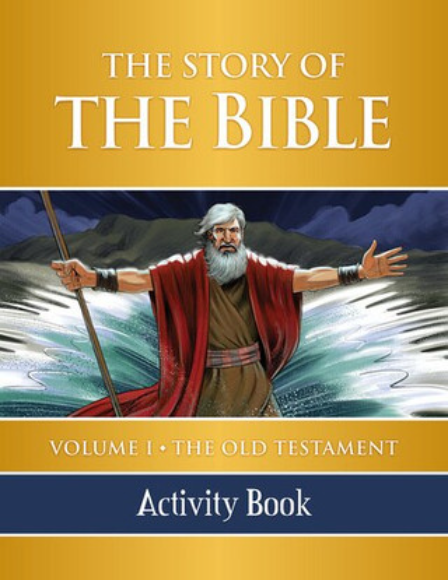
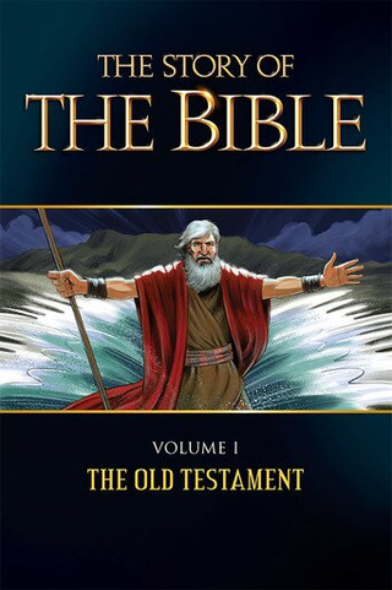 Required Textbook: The Story of the Bible Volume 1: The Old Testament
Required Textbook: The Story of the Bible Volume 1: The Old Testament
Optional:
Children should not just read the Bible but experience it. In The Story of the Bible, young readers will discover not only the sanctity and wisdom, but the excitement of the stories and events that shaped human history and brought about our salvation. Volume I, The Old Testament begins the journey. In these pages children will: visit the Garden of Eden; board Noah’s ark; climb the Tower of Babel; follow Moses through the Red Sea; listen to David’s harp; witness Samson’s strength; enter the lion’s den with Daniel; and learn God’s plan from the pro phets. Each account is told in story form to engage readers, with each narrative supplemented with actual Bible quotes. Their encounter with Scripture will never be the same.
During our live sessions, we will incorporate narration techniques, and utilize drawing, music, and sacred art, in order to enhance the study and understanding of the stories of the Old Testament. The teacher will also explain the assignment for the coming week and encourage class discussions pertaining to the week’s assignment, as we move through the various stories and characters of the Old Testament. Live classes will meet weekly, 30 weeks, beginning the first week of September (see the posted Academic Schedule for holidays) on the same day and time each week, for a one-hour-live class.
History 2nd Grade
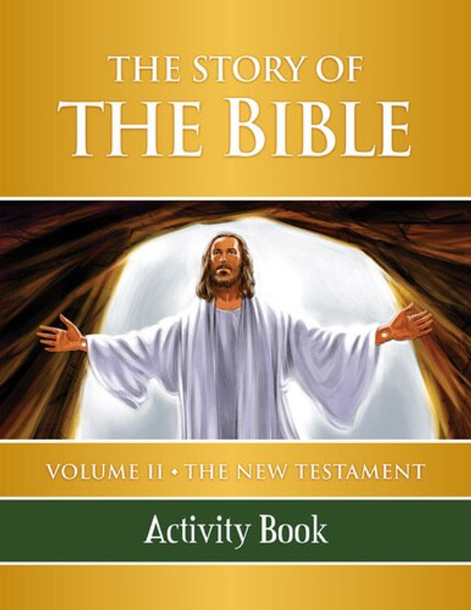
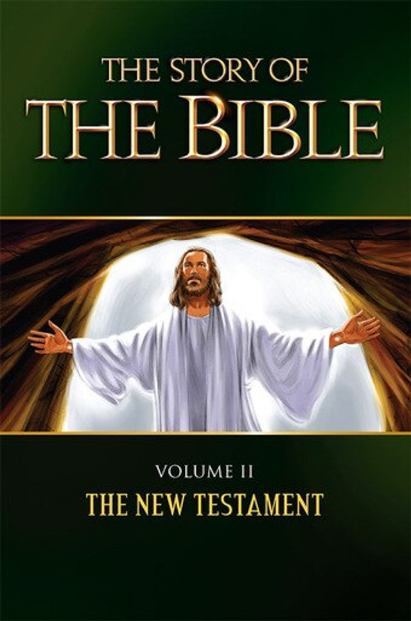 Required Textbook: The Story of the Bible Volume 2: The New Testament
Required Textbook: The Story of the Bible Volume 2: The New Testament
Optional:
Children should not just read the Bible but experience it. In The Story of the Bible young readers will discover not only the sanctity and wisdom, but the excitement of the stories and events that shaped human history and brought about our salvation. Volume I, The Old Testament begins the journey. In these pages children will: visit the Garden of Eden; board Noah’s ark; climb the Tower of Babel; follow Moses through the Red Sea; listen to David’s harp; witness Samson’s strength; enter the lion’s den with Daniel; and learn God’s plan from the prophets. Each account is told in story form to engage readers, with each narrative supplemented with actual Bible quotes. Their encounter with Scripture will never be the same.
During our live sessions, we will incorporate narration techniques, and utilize drawing, music, and sacred art, in order to enhance the study and understanding of the stories of the Old Testament. The teacher will also explain the assignment for the coming week and encourage class discussions pertaining to the week’s assignment, as we move through the various stories and characters of the Old Testament. Live classes will meet weekly, 30 weeks, beginning the first week of September (see the posted Academic Schedule for holidays) on the same day and time each week, for a one-hour-live class.
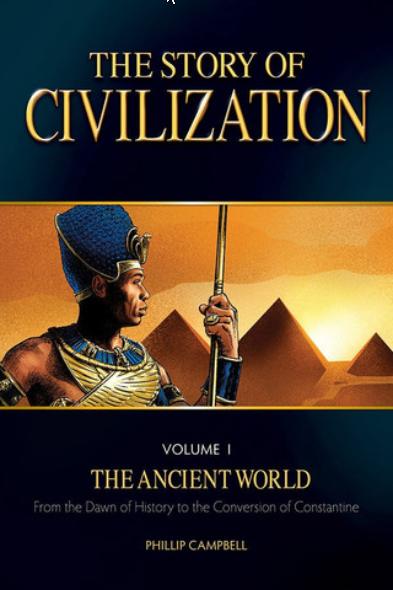
History 3rd Grade
Required Textbooks & Materials:
- The Story of Civilization Volume I: The Ancient World
- Test Book for The Story of Civilization Volume I: The Ancient World
- Activity Book for The Story of Civilization Volume I: The Ancient World
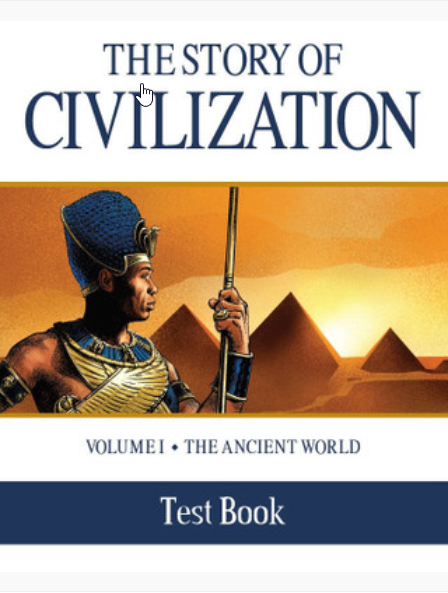
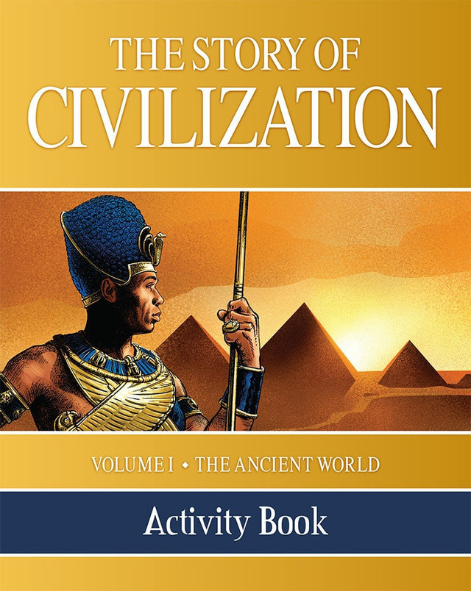 Volume I, The Ancient World covers the time periods from the dawn of history and the early nomads to the conversion of Emperor Constantine. Children will learn what life was like in the ancient civilizations of Egypt , Mesopotamia, Persia, Greece, Rome, and more, as well as learn the Old Testament stories of the Israelites and the coming of Christ. The Story of Civilization series by Phillip Campbell presents history through the faithful prism of the Catholic Church.
Volume I, The Ancient World covers the time periods from the dawn of history and the early nomads to the conversion of Emperor Constantine. Children will learn what life was like in the ancient civilizations of Egypt , Mesopotamia, Persia, Greece, Rome, and more, as well as learn the Old Testament stories of the Israelites and the coming of Christ. The Story of Civilization series by Phillip Campbell presents history through the faithful prism of the Catholic Church.
The live classes supplement homeschool study. We will prepare for weekly assignments and resolve issues with previous assignments; review dates and places; and discuss the history, always with an eye for its relevance to our Catholic faith.
Dates: This weekly, one-hour, live class will meet weekly, beginning the first week of September. Classes are 30 weeks (15 weeks per semester). For dates and holidays, see the Academic Calendar.
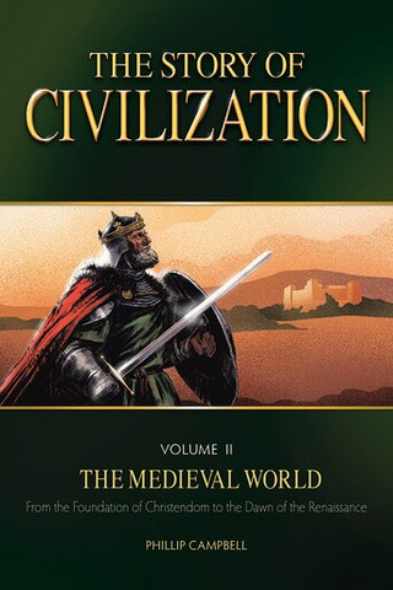 History 4th Grade
History 4th Grade
Required Textbooks & Materials:
- The Story of Civilization Volume II: The Medieval World
- Test Book for The Story of Civilization Volume II: The Medieval World
- Activity Book for The Story of Civilization Volume II: The Medieval World
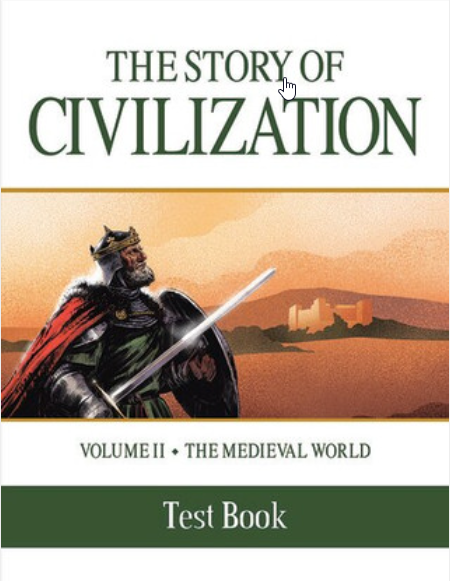 Volume II, The Medieval World begins where Volume I ended, just after the conversion of Emperor Constantine. The seeds of Christendom are being planted in the soil of Europe thanks to colossal figures like Sts. Ambrose, Patrick, and Benedict. The wonder of the Medieval world comes alive with brilliant tales of knights, crusaders, castles, and inventions. The Story of Civilization series by Phillip Campbell presents history through the faithful prism of the Catholic Church.
Volume II, The Medieval World begins where Volume I ended, just after the conversion of Emperor Constantine. The seeds of Christendom are being planted in the soil of Europe thanks to colossal figures like Sts. Ambrose, Patrick, and Benedict. The wonder of the Medieval world comes alive with brilliant tales of knights, crusaders, castles, and inventions. The Story of Civilization series by Phillip Campbell presents history through the faithful prism of the Catholic Church.
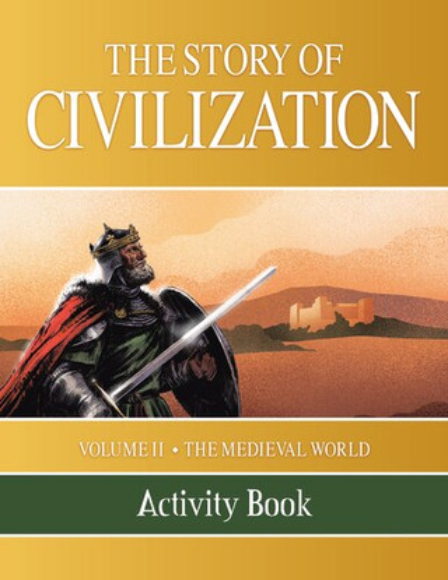 The live classes supplement homeschool study. We will prepare for weekly assignments and resolve issues with previous assignments; review dates and places; and discuss the history, always with an eye for its relevance to our Catholic faith.
The live classes supplement homeschool study. We will prepare for weekly assignments and resolve issues with previous assignments; review dates and places; and discuss the history, always with an eye for its relevance to our Catholic faith.
Dates: This weekly, one-hour, live class begins the first week of September. Classes are 30 weeks (15 weeks per semester). For dates and holidays, see the Academic Calendar.
History 5th Grade
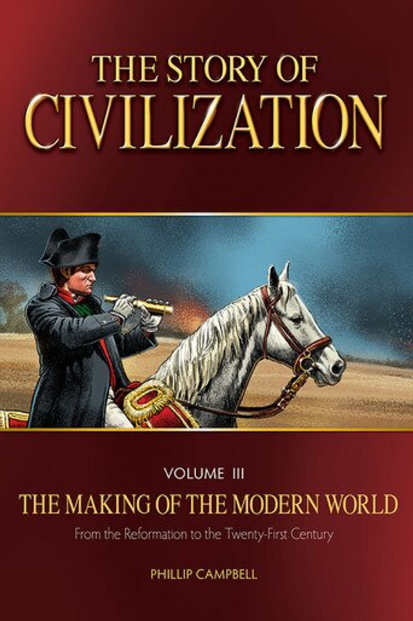 Required Textbooks & Materials:
Required Textbooks & Materials:
- The Story of Civilization Volume III: The Making of the Modern World
- Test Book for The Story of Civilization Volume III: The Making of the Modern World
- Activity Book for The Story of Civilization Volume III: The Making of the Modern World
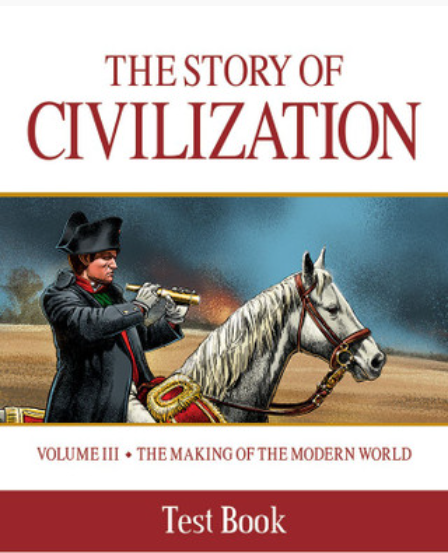 Description: Volume III, The Making of the Modern World begins with the Reformation. We watch this fracturing of the Church dramatically alter the course of modern Europe and the world at large. But during the most tumultuous times, God gives us the greatest saints, Sts. Pius V, Thomas More, John Vianney, and Margaret Mary Alacoque, as well as powerful leaders like Napoleon and Kings Henry VIII of England and Louis XIV of France. This volume brings us through present-day Europe, showing us the effects of two world wars and how the Church responded to these changing times. The Story of Civilization series by Phillip Campbell presents history through the faithful prism of the Catholic Church.
Description: Volume III, The Making of the Modern World begins with the Reformation. We watch this fracturing of the Church dramatically alter the course of modern Europe and the world at large. But during the most tumultuous times, God gives us the greatest saints, Sts. Pius V, Thomas More, John Vianney, and Margaret Mary Alacoque, as well as powerful leaders like Napoleon and Kings Henry VIII of England and Louis XIV of France. This volume brings us through present-day Europe, showing us the effects of two world wars and how the Church responded to these changing times. The Story of Civilization series by Phillip Campbell presents history through the faithful prism of the Catholic Church.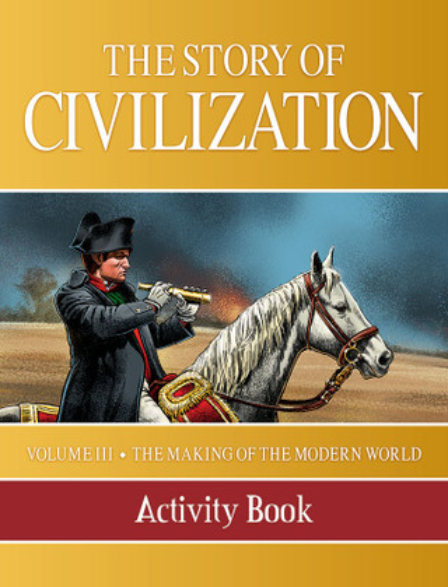
The live classes supplement homeschool study. We will prepare for weekly assignments and resolve issues with previous assignments; review dates and places; and discuss the history, always with an eye for its relevance to our Catholic faith.
Dates: This weekly, one-hour, live class will meet beginning the first week of September. Classes are 30 weeks (15 weeks per semester). For dates and holidays, see the Academic Calendar.
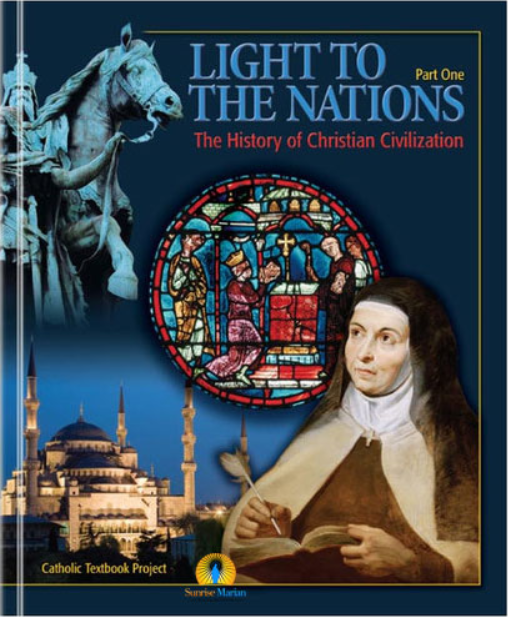
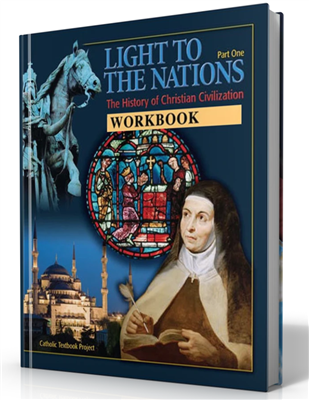 History 6th Grade
History 6th Grade
Required Textbooks & Materials:
From the coming of Jesus Christ, through the achievements of medieval Christendom, to the threshold of the Enlightenment projects of the 18th century, God’s work in history reveals itself. This course combines narrative accounts with the necessary facts, dates, short biographies, and concept definitions needed for a Christian cultural understanding. The central concern of the course is the effect on human civilization wrought by the Christian Faith. Drawing on the work of Catholic historians of the 20th century — Christopher Dawson, Hilaire Belloc, and Frederick Wilhelmsen — the authors have crafted a Catholic and accurate account of our Western heritage to convey our story to youth.
Live classes will meet weekly, 30 weeks, beginning the first week of September (see the posted Academic Schedule for holidays) on the same day and time each week, for a one-hour-live class. At that class the tutor will: explain the assignment for the coming week; answer your questions and perhaps pose some; note and address any problems or difficulties noticed in the prior week’s work; and lead a brief discussion of the topic at hand. These are rather informal and friendly live tutoring sessions.
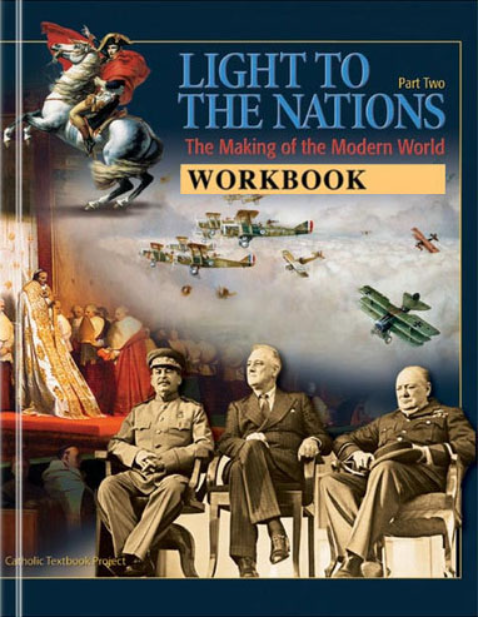 History 7th Grade
History 7th Grade
Required Textbook:
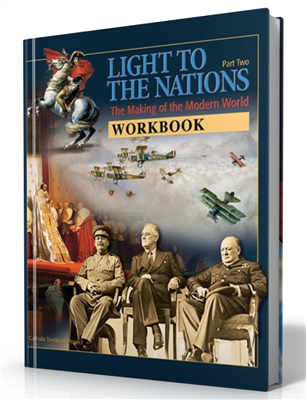 This course presents the history of the modern era in story form, giving proper emphasis to dates, central characters, and key concepts in each era. End of chapter reviews and other material included in the text highlight dates and events, characters in history, and definitions of key terms. The central consideration of this course is how modern ideas, institutions, and culture have developed from the high centuries of Christian culture. Drawing on the guidance of Catholic thinkers and the popes (particularly Leo XIII, Pius XI, Pius XII, John Paul II, and Benedict XVI), this history presents the hope that Christian thought and work will influence future society and its leaders.
This course presents the history of the modern era in story form, giving proper emphasis to dates, central characters, and key concepts in each era. End of chapter reviews and other material included in the text highlight dates and events, characters in history, and definitions of key terms. The central consideration of this course is how modern ideas, institutions, and culture have developed from the high centuries of Christian culture. Drawing on the guidance of Catholic thinkers and the popes (particularly Leo XIII, Pius XI, Pius XII, John Paul II, and Benedict XVI), this history presents the hope that Christian thought and work will influence future society and its leaders.
Live classes will meet weekly, 30 weeks, beginning the first week of September (see the posted Academic Schedule for holidays) on the same day and time each week, for a one-hour-live class. At that class the tutor will: explain the assignment for the coming week; answer your questions and perhaps pose some; note and address any problems or difficulties noticed in the prior week’s work; and lead a brief discussion of the topic at hand. These are rather informal and friendly live tutoring sessions.
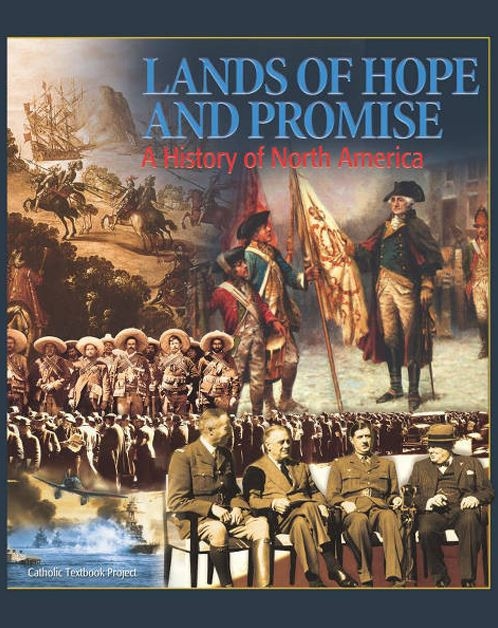 History 8th Grade:
History 8th Grade:
Required Textbooks:
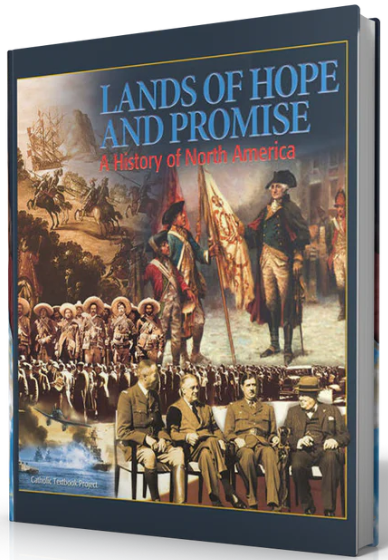 This course presents the history of North America from the landing of Columbus in 1492 to the late 20th century. It tells the story of the French, the Spanish, Dutch, Russian, and English settlements, and of the native peoples and cultures with which they interacted and came in conflict. It continues the story of the European settlement, focusing on the United States as the representative of Anglo-American culture and Mexico as the representative of Latin American culture. Though Lands of Hope and Promise tells the secular history found in standard textbooks, it includes the contributions of the Catholic Church, Catholic communities, and individual Catholics – along with Catholic ideas – to the rich and tempestuous American story. And it tells this history as a story, with all the drama that belongs to it. End of chapter reviews and other material included in the text highlight dates and events, characters in history, and definitions of key terms.
This course presents the history of North America from the landing of Columbus in 1492 to the late 20th century. It tells the story of the French, the Spanish, Dutch, Russian, and English settlements, and of the native peoples and cultures with which they interacted and came in conflict. It continues the story of the European settlement, focusing on the United States as the representative of Anglo-American culture and Mexico as the representative of Latin American culture. Though Lands of Hope and Promise tells the secular history found in standard textbooks, it includes the contributions of the Catholic Church, Catholic communities, and individual Catholics – along with Catholic ideas – to the rich and tempestuous American story. And it tells this history as a story, with all the drama that belongs to it. End of chapter reviews and other material included in the text highlight dates and events, characters in history, and definitions of key terms.
Live classes will meet weekly, 30 weeks, beginning the first week of September (see the posted Academic Schedule for holidays) on the same day and time each week, for a one-hour-live class. At that class the tutor will: explain the assignment for the coming week; answer your questions and perhaps pose some; note and address any problems or difficulties noticed in the prior week’s work; and lead a brief discussion of the topic at hand. These are rather informal and friendly live tutoring sessions.
 History 8th Grade:
History 8th Grade:
Required Textbooks:
 This course presents the history of North America from the landing of Columbus in 1492 to the late 20th century. It tells the story of the French, the Spanish, Dutch, Russian, and English settlements, and of the native peoples and cultures with which they interacted and came in conflict. It continues the story of the European settlement, focusing on the United States as the representative of Anglo-American culture and Mexico as the representative of Latin American culture. Though Lands of Hope and Promise tells the secular history found in standard textbooks, it includes the contributions of the Catholic Church, Catholic communities, and individual Catholics – along with Catholic ideas – to the rich and tempestuous American story. And it tells this history as a story, with all the drama that belongs to it. End of chapter reviews and other material included in the text highlight dates and events, characters in history, and definitions of key terms.
This course presents the history of North America from the landing of Columbus in 1492 to the late 20th century. It tells the story of the French, the Spanish, Dutch, Russian, and English settlements, and of the native peoples and cultures with which they interacted and came in conflict. It continues the story of the European settlement, focusing on the United States as the representative of Anglo-American culture and Mexico as the representative of Latin American culture. Though Lands of Hope and Promise tells the secular history found in standard textbooks, it includes the contributions of the Catholic Church, Catholic communities, and individual Catholics – along with Catholic ideas – to the rich and tempestuous American story. And it tells this history as a story, with all the drama that belongs to it. End of chapter reviews and other material included in the text highlight dates and events, characters in history, and definitions of key terms.
Live classes will meet weekly, 30 weeks, beginning the first week of September (see the posted Academic Schedule for holidays) on the same day and time each week, for a one-hour-live class. At that class the tutor will: explain the assignment for the coming week; answer your questions and perhaps pose some; note and address any problems or difficulties noticed in the prior week’s work; and lead a brief discussion of the topic at hand. These are rather informal and friendly live tutoring sessions.
History 9th Grade
Required Textbooks:
- Evolution of Civilizations by Carroll Quigley
- Land of Hope: An Invitation to the Great American Story by Wilfred M. McClay
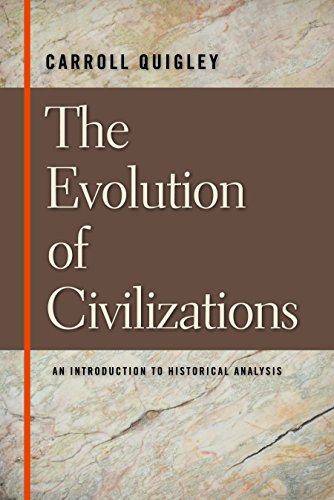 We will be covering Carroll Quigley’s The Evolution of Civilizations, which is a comprehensive survey of history from humanity’s agricultural beginnings through the industrial revolution and finally with the modern era in the 21st century. Quigley was a legendary teacher at the Georgetown School of Foreign Service. His course on the history of civilization was extraordinary in its scope and in its impact on his students. Like the course, The Evolution of Civilizations is a comprehensive and perceptive look at the factors behind the rise and fall of civilizations. Quigley defines a civilization as “a producing society with an instrument of expansion.” A civilization’s decline is not inevitable but occurs when its instrument of expansion is transformed into an institution—that is, when social arrangements that meet real social needs are transformed into social institutions serving their own purposes regardless of real social needs.
We will be covering Carroll Quigley’s The Evolution of Civilizations, which is a comprehensive survey of history from humanity’s agricultural beginnings through the industrial revolution and finally with the modern era in the 21st century. Quigley was a legendary teacher at the Georgetown School of Foreign Service. His course on the history of civilization was extraordinary in its scope and in its impact on his students. Like the course, The Evolution of Civilizations is a comprehensive and perceptive look at the factors behind the rise and fall of civilizations. Quigley defines a civilization as “a producing society with an instrument of expansion.” A civilization’s decline is not inevitable but occurs when its instrument of expansion is transformed into an institution—that is, when social arrangements that meet real social needs are transformed into social institutions serving their own purposes regardless of real social needs.
His work deals with events and economic systems, but it also deals with how historians write histories and the intermingling of the scientific method with the fields of history and historiography. The rise and fall of civilizations, how time periods are differentiated and devised, and how historical events shape civilization are all topics contained within Quigley’s work. The cyclical nature of history with human economics and conflict seeming to appear and reappear in observable patterns will be a topic of discussion.
 Land of Hope is a compact, inexpensive, authoritative, and compulsively readable book that will offer to intelligent young Americans a coherent, persuasive, and inspiring narrative of their own country. Such an account will shape and deepen their sense of the land they inhabit, and by making them understand that land’s roots, will equip them for the privileges and responsibilities of citizenship in American society, and provide them with a vivid and enduring sense of membership in one of the greatest enterprises in human history: the exciting, perilous, and immensely consequential story of their own country.
Land of Hope is a compact, inexpensive, authoritative, and compulsively readable book that will offer to intelligent young Americans a coherent, persuasive, and inspiring narrative of their own country. Such an account will shape and deepen their sense of the land they inhabit, and by making them understand that land’s roots, will equip them for the privileges and responsibilities of citizenship in American society, and provide them with a vivid and enduring sense of membership in one of the greatest enterprises in human history: the exciting, perilous, and immensely consequential story of their own country.
The existing texts simply fail to tell that story with energy and conviction. They are more likely to reflect the skeptical outlook of specialized professional academic historians, an outlook that supports a fragmented and fractured view of modern American society, and that fails to convey to young people the greater arc of that history. Or they reflect the outlook of radical critics of American society, who seek to debunk the standard American narrative, and has an enormous, and largely negative, effect upon the teaching of American history in American high schools and colleges.
This state of affairs cannot continue for long without producing serious consequences. A great nation needs and deserves a great and coherent narrative, as an expression of its own self-understanding: and it needs to convey that narrative to its young effectively. It perhaps goes without saying that such a narrative cannot be a fairy tale or a whitewash of the past; it will not be convincing if it is not truthful. But there is no necessary contradiction between an honest account and an inspiring one. This account seeks to provide both.
Note: Much history is included in our interdisciplinary Great Books courses.
Live classes will meet weekly, 30 weeks, beginning the first week of September (see the posted Academic Schedule for holidays) on the same day and time each week, for a one-hour-live class. At that class the tutor will: explain the assignment for the coming week; answer your questions and perhaps pose some; note and address any problems or difficulties noticed in the prior week’s work; and lead a brief discussion of the topic at hand. These are rather informal and friendly live tutoring sessions.
History 10th and 11th Grades
Required Textbook: Tragedy & Hope: History of the World in Our Time (1895-1965)
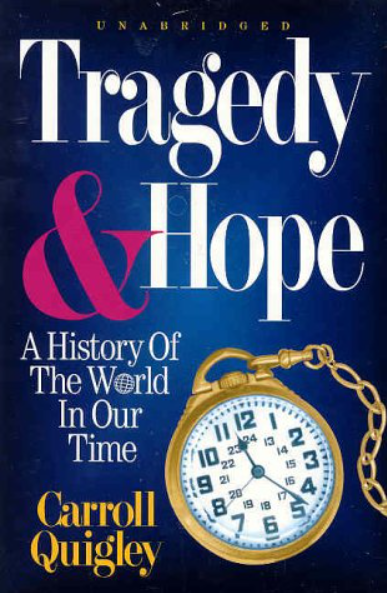 We will be studying Caroll Quigley’s extensive treatise on history. Carroll Quigley was a legendary teacher at the Georgetown School of Foreign Service. His course on the history of civilization was extraordinary in its scope and in its impact on his students. Like the course, The Evolution of Civilizations is a comprehensive and perceptive look at the factors behind the rise and fall of civilizations. Tragedy & Hope: A History of the World in Our Time by Carroll Quigley is the ultimate insider admission of a secret global elite that has impacted nearly every modern historical event. Learn how the Anglo-American banking elite were able to secretly establish and maintain their global power. This massive hardcover book of 1348 pages provides a detailed world history beginning with the industrial revolution and imperialism through two world wars, a global depression and the rise of communism. Tragedy & Hope is the definitive work on the world’s power structure and an essential source material for understanding the history, goals and actions of the New World Order.
We will be studying Caroll Quigley’s extensive treatise on history. Carroll Quigley was a legendary teacher at the Georgetown School of Foreign Service. His course on the history of civilization was extraordinary in its scope and in its impact on his students. Like the course, The Evolution of Civilizations is a comprehensive and perceptive look at the factors behind the rise and fall of civilizations. Tragedy & Hope: A History of the World in Our Time by Carroll Quigley is the ultimate insider admission of a secret global elite that has impacted nearly every modern historical event. Learn how the Anglo-American banking elite were able to secretly establish and maintain their global power. This massive hardcover book of 1348 pages provides a detailed world history beginning with the industrial revolution and imperialism through two world wars, a global depression and the rise of communism. Tragedy & Hope is the definitive work on the world’s power structure and an essential source material for understanding the history, goals and actions of the New World Order.
Note: Much history is included in our interdisciplinary Great Books courses.
Live classes will meet weekly, 30 weeks, beginning the first week of September (see the posted Academic Schedule for holidays) on the same day and time each week, for a one-hour-live class. At that class the tutor will: explain the assignment for the coming week; answer your questions and perhaps pose some; note and address any problems or difficulties noticed in the prior week’s work; and lead a brief discussion of the topic at hand. These are rather informal and friendly live tutoring sessions.
History 12th Grade
Required Textbook: Witness to Hope, by George Weigel
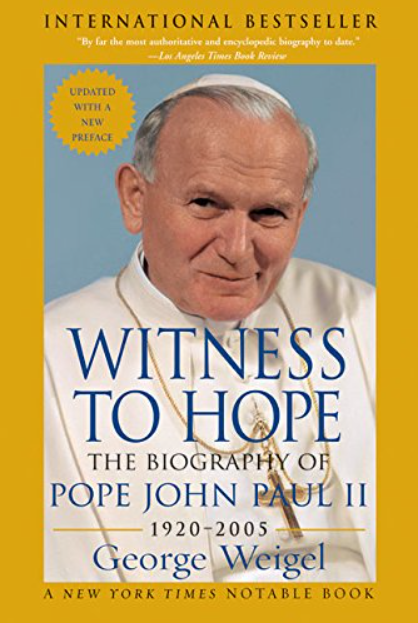 This course is centered on the text Witness to Hope, George Weigel’s biography of Pope John Paul II. Live classes for Witness to Hope will meet weekly, 30 weeks, beginning the first week of September (see the posted Academic Schedule for holidays) on the same day and time each week, for a one-hour-live class. At that class the tutor will: explain the assignment for the coming week; answer your questions and perhaps pose some; note and address any problems or difficulties noticed in the prior week’s submitted written assignments; and lead a brief discussion of the topic at hand. These are rather informal and friendly live tutoring sessions. Students will be expected to submit one assignment each week consisting of written answers to the weekly questions, and one essay each semester (two essays per school year), consisting of four pages.
This course is centered on the text Witness to Hope, George Weigel’s biography of Pope John Paul II. Live classes for Witness to Hope will meet weekly, 30 weeks, beginning the first week of September (see the posted Academic Schedule for holidays) on the same day and time each week, for a one-hour-live class. At that class the tutor will: explain the assignment for the coming week; answer your questions and perhaps pose some; note and address any problems or difficulties noticed in the prior week’s submitted written assignments; and lead a brief discussion of the topic at hand. These are rather informal and friendly live tutoring sessions. Students will be expected to submit one assignment each week consisting of written answers to the weekly questions, and one essay each semester (two essays per school year), consisting of four pages.
Witness to Hope is the authoritative biography of Pope John Paul II, one of the singular figures — some might argue the singular figure — of our time. As even his critics concede, John Paul II occupied a unique place on the world stage and put down intellectual markers that no one could ignore or avoid as humanity entered a new millennium fraught with possibility and danger. The Pope was a man of prodigious energy who played a crucial yet insufficiently explored role in some of the most momentous events of our time, including the collapse of European communism, the quest for peace in the Middle East, and the democratic transformation of Latin America. With unprecedented cooperation from John Paul II and the people who knew and worked with him throughout his life, George Weigel offers a groundbreaking portrait of the Pope as a man, a thinker, and a leader whose religious convictions defined a new approach to world politics — and changed the course of history.”
Note: Much history is included in our interdisciplinary Great Books courses.
Live classes will meet weekly, 30 weeks, beginning the first week of September (see the posted Academic Schedule for holidays) on the same day and time each week, for a one-hour-live class. At that class the tutor will: explain the assignment for the coming week; answer your questions and perhaps pose some; note and address any problems or difficulties noticed in the prior week’s work; and lead a brief discussion of the topic at hand. These are rather informal and friendly live tutoring sessions.


